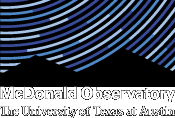StarDate Teams with Humanities Texas, Brings Native Skies to Nation's Airwaves
20 September 2004
AUSTIN — StarDate Radio has partnered with Humanities Texas, the state partner of the National Endowment for the Humanities, to bring programs on the astronomy of native Texas cultures to the nation’s airwaves. Beginning today and continuing through September 23, StarDate’s approximately 350 affiliates across the United States will broadcast these "Texas Native Skies" programs to a daily audience of two million listeners.
The programs will also air on about 180 affiliates carrying StarDate’s Spanish-language sister program, Universo. The non-profit StarDate and Universo radio programs are produced by The University of Texas at Austin McDonald Observatory.
The programs in this series emphasize the connection between the sky and the diverse indigenous populations of Texas. That connection played an important role in everyday life, including agriculture, politics, religion, architecture, and art. The programs also discuss how today’s archaeologists determine possible connections between the sky and abandoned structures, skywatching sites, rock art, and other sites and artifacts.
"The mission of the Humanities Texas grants program is to support public programs grounded in the humanities," said Humanities Texas Executive Director Michael L. Gillette. "We are pleased to help StarDate and Universo bring this uniquely Texas story to the rest of the nation."
The first set of programs emphasizes the astronomy of far West Texas and the Panhandle. The 800-year-old ruins of a pueblo near El Paso show a possible alignment to the sunrise at the equinoxes. (The autumnal equinox occurs at 11:30 a.m. CDT September 22.) Colorful rock art at Hueco Tanks State Historical Park may show the astronomical influence of Mesoamerica on the cultures of ancient Texas. Archaeological sites in the Panhandle, which were abandoned about 600 years ago, also have possible astronomical alignments.
Additional programs in the Texas Native Skies series will air in December and in 2005. These programs will cover the astronomy and skylore of the Caddo, discuss the rock art of the lower Pecos, and describe possible astronomical alignments in the Davis Mountains.
A web site with more information, including photos of the Texas Native Skies sites, has been created at http://texasnativeskies.org. More information on the StarDate and Universo radio programs is available at http://stardate.org and the Spanish-language web site http://radiouniverso.org.
For more information about the Humanities Texas grants program, please contact Eric Lupfer at (512) 440-1991 ext. 120 or elupfer@humanitiestexas.org. Grant guidelines and applications are available at http://www.humanitiestexas.org.
— END —





